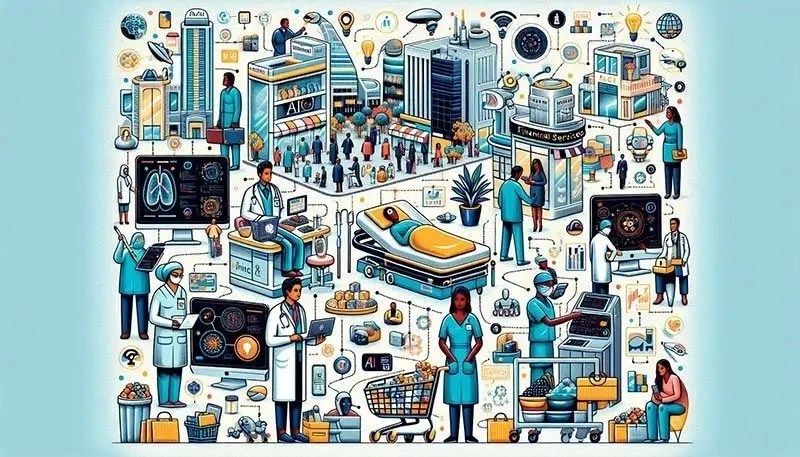Beyond ChatGPT: What Does it Take to Create Real CX AI?


- 1. Introduction
- 2. Key Takeaways
- 3. Demystifying AI Automation
- 4. The Essence of AI in Automation
- 5. The Role of Robotic Process Automation (RPA)
- 6. The Impact of AI Automation on Business Workflows
- 7. Revolutionizing Data Entry and Processing
- 8. Enhancing Customer Experience Through Intelligent Automation
- 9. Implementing AI Automation in Your Business
- 10. Identifying Opportunities for AI-Driven Efficiency
- 11. Selecting the Right AI Tools and Technologies
- 12. Training Data and Preparing Systems for AI Integration
- 13. Real-World Applications of AI Automation Across Industries
- 14. Streamlining Healthcare Operations with AI
- 15. Innovating Retail with Smart Inventory Management
- 16. Automating Financial Services for Better Decision Making
- 17. Overcoming Challenges in AI Automation Adoption
- 18. Bridging the Skills Gap for AI Readiness
- 19. Ensuring Seamless Integration with Existing Infrastructure
- 20. Enhancing Remote Work with AI Automation
- 21. The Future Landscape of AI and Automation
- 13. Summary
- 14. Call to Action
- 15. Frequently Asked Questions
Intelligent automation marks the convergence of artificial intelligence and automation, reshaping how businesses operate. This technology not only automates tasks but also evolves with ongoing learning, driving efficiency and scaling operations. In this article, we will delve into the real-world applications of AI automation, the tools enhancing business workflows, and the considerations for implementing this technology.
Key Takeaways
- AI automation integrates AI learning and decision-making capabilities with traditional automation, transforming business operations to be more efficient and innovative. Over half of organizations already pursue AI automation to handle tasks previously done by humans.
- AI automation impacts multiple aspects of business, from enhancing data entry and processing with OCR and NLP to improving customer experiences through personalized services and AI-driven customer support systems like chatbots. Additionally, cognitive automation enables systems to understand and process complex data, further enhancing business operations.
- Implementing AI automation requires setting clear goals, selecting suitable projects and technology partners, and training employees, with businesses experiencing real-world benefits across industries, including healthcare, retail, and financial services.
Demystifying AI Automation

AI automation is a new frontier for innovation, combining artificial intelligence capabilities with automation technologies. It’s like giving traditional automation a brain! This fusion creates systems that can learn from data and make decisions, distinguishing it from traditional automation, which follows predefined routines without the ability to learn.The cornerstone of AI automation lies in its diverse components - workflow orchestration, business rules, system automation, and content processing. The deployment of AI automation involves implementing ai technologies such as robotic process automation, intelligent process automation, APIs, and software robots. These technologies orchestrate complex business processes and automate routine tasks like document classification, something unthinkable in an era dominated by human labor.The shift towards AI automation is not a wave of the future - it is happening right now. With over half of the organizations looking to implement AI and automation technologies, we are embarking on an era where machines handle more tasks that were traditionally performed by humans. This trend is driving us towards a future where businesses are more efficient, productive, and innovative.
The Essence of AI in Automation
Artificial Intelligence (AI) is the magic sauce that gives machines human-like capabilities. Cognitive computing, a subset of AI, focuses on simulating human thought processes in a computerized model. Machine learning, another branch of AI, enables machines to learn from past data and predict future outcomes. It’s like teaching a child to ride a bike. Once learned, they can ride without assistance, improving over time through experience. Similarly, machines equipped with AI technologies can operate without human input, harnessing methods for analyzing scenarios and intelligently adjusting actions.AI technologies in automation utilize learning and decision-making capabilities, allowing them to work independently of human intervention. This independence is achieved through AI techniques like:- Neural networks, which are instrumental in processing complex data sets
- Machine learning algorithms, which enable the system to learn and improve over time
- Natural language processing, which allows the system to understand and respond to human language
- Computer vision, which enables the system to interpret and analyze visual data
The Role of Robotic Process Automation (RPA)
Among the various AI technologies, Robotic Process Automation (RPA) holds a significant role. RPA is like a diligent, tireless employee, taking care of repetitive tasks and freeing up human resources for more strategic work. In fact, jobs with repetitive tasks are evolving into roles that focus on managing and troubleshooting RPA systems.For instance, consider Magical, an AI-driven customer support automation software. It uses RPA and intelligent automation solutions to handle repetitive tasks such as answering frequently asked questions. This automation not only boosts productivity but also enhances the quality of customer service.AI automation is like a superhero, swooping in to revolutionize business process management. It leads to:- more efficient, productive, and high-quality operational processes
- increased accuracy and reduced errors
- faster processing times
- improved customer experience
- cost savings and resource optimization
Revolutionizing Data Entry and Processing

Enhancing Customer Experience Through Intelligent Automation

AI automation is also enhancing customer experiences. Artificial intelligence models leverage natural language processing to comprehend customer inquiries and preferences, enabling the provision of tailored support and services. It’s like having a personal concierge who knows your tastes and preferences, providing a truly personalized service.The advancements in conversational AI and virtual assistants are further revolutionizing customer service. These AI-driven chatbots and virtual assistants provide:
- Real-time, adaptive customer support
- Simulated human conversation
- 24/7 availability
- No fatigue or breaks
Implementing AI Automation in Your Business
Now that we have explored what AI automation is and how it impacts businesses, let’s turn our attention to how we can implement it in our own businesses. Much like embarking on a journey, implementing AI automation starts with setting clear goals. This is followed by evaluating current processes and forming a knowledgeable team - the navigators of this exciting journey, often referred to as the digital workforce.Businesses can kick off their AI automation journey by finding suitable business cases within their operations. Conducting pilot projects to understand the impact and resolve challenges is like dipping your toes in the water before taking the plunge into test automation.Choosing the right travel companion is crucial for a successful journey. Similarly, selecting a reliable technology partner is crucial for the successful implementation of AI. Leaders must have clarity on the AI technologies adopted to tackle the right business challenges. After launching AI initiatives, businesses should continuously evaluate performance, refine strategies, and communicate the benefits to ensure wide understanding and support.Identifying Opportunities for AI-Driven Efficiency
Identifying opportunities for AI-driven efficiency is like finding the best route for your journey. Businesses can do this by assessing processes such as customer service and supply chain management to determine where improvements are necessary.Initiating manageable AI projects that support specific business objectives allows organizations to gain experience in AI integration. Utilizing an intelligent automation platform can streamline these efforts, making it easier to identify and implement AI solutions. It’s like learning to walk before you run, developing essential skills and gaining confidence along the way.Artificial intelligence can significantly minimize human errors in areas like manual data entry, where human intelligence is prone to mistakes. This leads to improved data quality and operational integrity, making AI an essential tool in the quest for efficiency.Selecting the Right AI Tools and Technologies
Selecting the right AI tools and technologies is like choosing the right vehicle for your journey. For instance, AI-powered automation and RPA significantly enhance invoice management by automating tasks like data extraction and validation, as well as streamlining the approval workflow.There are also AI tools like OpenAI Codex that specialize in generating code from natural language input, demonstrating the advanced capabilities of modern AI tools.When selecting AI tools for business operations, it’s crucial to assess factors such as scalability, the ease of system integration, and the availability of support services. These considerations ensure that the chosen tools are a perfect fit for your business journey.Training Data and Preparing Systems for AI Integration
Preparing your systems for AI integration involves ensuring data quality, compatibility, and security. Developing an effective AI integration strategy is crucial to address these aspects. Quality and availability of data are critical for AI applications. Just like a car needs fuel to run, AI systems need quality data to function.Many businesses may struggle with poor-quality data or data insufficiency, leading to misguided AI strategies. These are like potholes on the road, causing delays and disruptions in the journey.Ensuring compatibility with existing systems is another key challenge for successful AI tool integration. Integrating AI with incompatible legacy systems can be complex and lead to inefficiencies. It’s like trying to fit a square peg into a round hole. Therefore, a well-planned approach is essential for seamless integration.Real-World Applications of AI Automation Across Industries

AI automation is not just a concept - it has real-world applications across various industries through intelligent automation solutions. Some examples include:
- Predicting equipment failures in manufacturing
- Enhancing the shopping experience in retail
- Improving customer service through chatbots
- Streamlining administrative tasks in healthcare
- Personalizing recommendations in e-commerce
Streamlining Healthcare Operations with AI
Specifically, in the healthcare sector, AI-driven healthcare solutions are streamlining operations in several ways. AI algorithms complement human labor by assisting doctors in accurate diagnosis and identification of suitable treatments for patients. It’s like having a super-smart assistant who’s always on call, ready to help with patient care.AI-driven disease detection tools perform data analysis on patient data for abnormalities, contributing to high-accuracy disease identification. These tools are like a highly skilled detective, identifying even the slightest clues to detect diseases.Robotic tools powered by AI automation aid surgeons in conducting precise actions during surgery, reducing the risk of errors. Additionally, AI automation supports patient monitoring by offering healthcare providers tools for remote patient observation, collecting real-time data for insight into potential health complications.Innovating Retail with Smart Inventory Management
In the retail industry, AI-powered retail solutions are innovating operations through smart inventory management. Retail businesses have integrated machine learning algorithms to predict stock levels, leading to better inventory control. It’s like having a crystal ball that predicts what products will be in demand, ensuring that stocks are always optimized.AI technologies in retail have also been used to optimize the online shopping experience. By learning customer preferences and presenting related options, AI enhances the customer’s shopping journey. It’s like having a personal shopper who knows your taste and recommends products accordingly.Furthermore, AI solutions in retail not only manage stock levels but also identify customer preferences and enhance the overall smart shopping experience. It’s like having a personal assistant who knows your shopping list and helps you navigate the store efficiently.Automating Financial Services for Better Decision Making
In the financial services sector, AI-driven financial services are making waves by improving decision-making, risk assessment, and fraud detection. AI tools automate the underwriting process by analyzing a potential borrower’s financial history to evaluate risk efficiently. It’s like having a financial advisor who can accurately assess a borrower’s credibility.AI aids in financial fraud detection by learning from historical transaction data to identify patterns and anomalies indicative of fraudulent activities. This is akin to a vigilant security guard who keeps a watchful eye on transactions, ensuring the safety of your finances.Automated AI platforms streamline financial investing by utilizing algorithms for tasks like portfolio management and optimizing tax strategies. It’s like having a personal investment advisor who ensures your investments are always optimized.Overcoming Challenges in AI Automation Adoption
Despite the numerous benefits of AI automation, the road to adoption is not always smooth. Businesses face several challenges, including the lack of specialized knowledge, integration with existing systems, and high implementation costs. However, just like any journey, these challenges can be overcome with a proper AI adoption strategy.One of the key challenges is the lack of specialized knowledge. To fully benefit from AI automation, businesses must bridge the skills gap by training and retraining workers in necessary skills like:- programming
- social skills
- emotional skills
- higher cognitive skills
Bridging the Skills Gap for AI Readiness
Upskilling the workforce is an essential step when adopting AI tools. It ensures that employees are capable of working effectively with the new technology. It’s like training your team to use a new tool or software - you need to make sure they have the necessary skills to use it effectively. This is where AI skills development becomes crucial.Investing in skill development is essential to prepare a business for AI automation. Just as a pilot needs to undergo extensive training to fly a plane, employees need to be trained in AI technologies to harness their full potential.To overcome the skills gap for AI readiness, businesses should:- Invest in training and development programs to upskill their workforce in AI technologies
- Build AI competency internally
- Ensure a smooth transition to AI automation
Ensuring Seamless Integration with Existing Infrastructure
Seamless integration with existing infrastructure is crucial for the successful implementation of AI tools. AI infrastructure integration involves creating a well-defined reference architecture to guide technology selection and ensure the infrastructure can support AI projects. It’s like building a house - you need a blueprint to guide the construction process.Data privacy and security are critical considerations when preparing for AI integration. Just as you wouldn’t leave your house unlocked, you need to ensure that your data is secure when using AI technologies, especially when sensitive information is involved.Maintaining and optimizing AI tools is an ongoing process. Regularly reviewing AI tool performance, looking for new features or updates, and seeking feedback from the team are best practices for ensuring continued efficiency. Incorporating a thorough testing process can further enhance the performance of these AI tools.Enhancing Remote Work with AI Automation
With the rise of remote work, AI automation is playing a crucial role in enhancing productivity and collaboration. AI-powered remote work solutions, such as AI-powered virtual assistants and productivity tools, are used to schedule meetings, attend them, take detailed notes, transcribe summaries, and suggest action items, thereby streamlining administrative tasks for remote workers.Applications such as Otter.ai and Fathom offer the following functionalities:- Record audio
- Give key takeaways from meetings
- Auto-connect to virtual meeting platforms
- Search past meetings
- Catering to individual learning needs and preferences
- Fostering a culture of continuous professional development
- Providing rich insights into employees’ performance and well-being through AI-powered analytics platforms
- Improving job satisfaction and productivity
- Acting as a catalyst for achieving work-life balance


